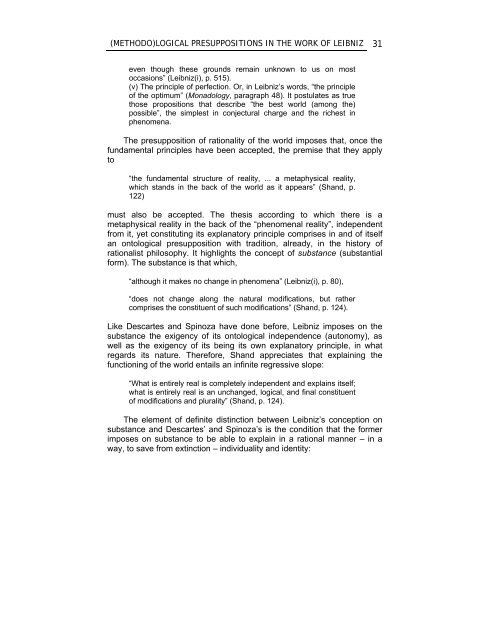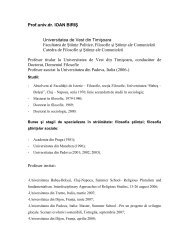analele universităţii de vest din timişoara annales universitatis ...
analele universităţii de vest din timişoara annales universitatis ...
analele universităţii de vest din timişoara annales universitatis ...
Create successful ePaper yourself
Turn your PDF publications into a flip-book with our unique Google optimized e-Paper software.
(METHODO)LOGICAL PRESUPPOSITIONS IN THE WORK OF LEIBNIZ 31<br />
even though these grounds remain unknown to us on most<br />
occasions” (Leibniz(i), p. 515).<br />
(v) The principle of perfection. Or, in Leibniz’s words, “the principle<br />
of the optimum” (Monadology, paragraph 48). It postulates as true<br />
those propositions that <strong>de</strong>scribe “the best world (among the)<br />
possible”, the simplest in conjectural charge and the richest in<br />
phenomena.<br />
The presupposition of rationality of the world imposes that, once the<br />
fundamental principles have been accepted, the premise that they apply<br />
to<br />
“the fundamental structure of reality, ... a metaphysical reality,<br />
which stands in the back of the world as it appears” (Shand, p.<br />
122)<br />
must also be accepted. The thesis accor<strong>din</strong>g to which there is a<br />
metaphysical reality in the back of the “phenomenal reality”, in<strong>de</strong>pen<strong>de</strong>nt<br />
from it, yet constituting its explanatory principle comprises in and of itself<br />
an ontological presupposition with tradition, already, in the history of<br />
rationalist philosophy. It highlights the concept of substance (substantial<br />
form). The substance is that which,<br />
“although it makes no change in phenomena” (Leibniz(i), p. 80),<br />
“does not change along the natural modifications, but rather<br />
comprises the constituent of such modifications” (Shand, p. 124).<br />
Like Descartes and Spinoza have done before, Leibniz imposes on the<br />
substance the exigency of its ontological in<strong>de</strong>pen<strong>de</strong>nce (autonomy), as<br />
well as the exigency of its being its own explanatory principle, in what<br />
regards its nature. Therefore, Shand appreciates that explaining the<br />
functioning of the world entails an infinite regressive slope:<br />
“What is entirely real is completely in<strong>de</strong>pen<strong>de</strong>nt and explains itself;<br />
what is entirely real is an unchanged, logical, and final constituent<br />
of modifications and plurality” (Shand, p. 124).<br />
The element of <strong>de</strong>finite distinction between Leibniz’s conception on<br />
substance and Descartes’ and Spinoza’s is the condition that the former<br />
imposes on substance to be able to explain in a rational manner – in a<br />
way, to save from extinction – individuality and i<strong>de</strong>ntity:




